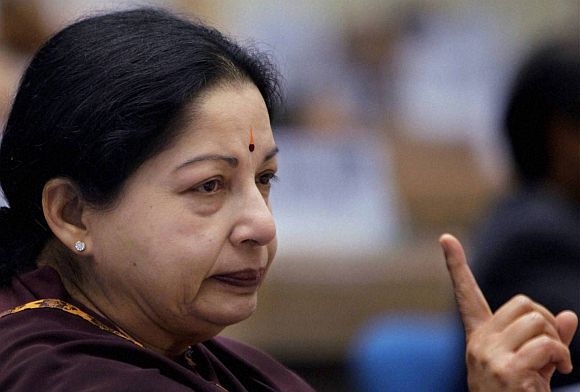In a letter to Prime Minister Narendra Modi, Tamil Nadu Chief Minister Jayalalithaa states that NEET is a direct infringement on the state's rights & would cause injustice to the students. TE Narasimhan reports
 Tamil Nadu Chief Minister J Jayalalithaa has asked the Centre to let the state continue with its existing system of admission to medical and dental colleges and not be forced to implement National Eligibility cum Entrance Test even in the future.
Tamil Nadu Chief Minister J Jayalalithaa has asked the Centre to let the state continue with its existing system of admission to medical and dental colleges and not be forced to implement National Eligibility cum Entrance Test even in the future.
In a letter to Prime Minister Narendra Modi, a first after taking over as the chief minister, Jayalalithaa thanked him for the speedy promulgation of an Ordinance on NEET. It provided for an exemption from NEET for this academic year (2016-17) with respect to the state government seats (in government or private medical colleges) at an under-graduate level.
This has, for the time being, put to rest the mental agony, stress and anxiety of lakhs of students and their parents that are aspiring for medical admission in the current year under the state quota, she said.
"The introduction of NEET would be a direct infringement on the rights of the state and would cause grave injustice to the students of Tamil Nadu who have already been covered by a fair and transparent admission policy laid down by the government of Tamil Nadu, which has been working well," the chief minister wrote.
While the Ordinance would temporarily address the issue for the current year, Tamil Nadu’s situation is distinct and different from other states, she said.
The government has taken a number of steps, from 2005 onwards, in the direction of systematising the admission process to medical colleges, later abolished entrance examinations for professional undergraduate courses in the state, by enacting the Tamil Nadu Admission in Professional Educational Institutions Act, 2006.
This Act was finally given effect to after receiving the assent of the President under Article 254(2) of the Constitution. This Act has been upheld by a decision of the division bench of the Madras high court which was affirmed by the Supreme Court, she explained.
This measure was taken keeping in view the interests of students, particularly from the weaker sections and rural areas, to ensure that a level playing field is created, she added.
Common entrance exams favour 'urban elite'
The All India Anna Dravida Munnetra Kazhagam government's stance is that the rural students and students from poorer socio-economic backgrounds will be unable to compete with urban elite students in such Common Entrance Examinations, which are designed to favour the "urban elite".
The rural students will be put to great disadvantage because they lack the resources to enroll in training institutions and access materials available to urban students.
A large number of socially and economically backward meritorious rural students have benefited by the state’s decision to abolish the Common Entrance Examination, she claimed.
The introduction of NEET would nullify the implementation of the policy initiatives and socio-economic objectives of the State, as the regulations for a national test may not have such enabling provisions.
The national test is out of tune with the prevailing socio-economic milieu and administrative requirements of Tamil Nadu.
She requested the prime minister to take necessary measures to ensure that Tamil Nadu is permitted to continue its existing system.












 © 2025
© 2025